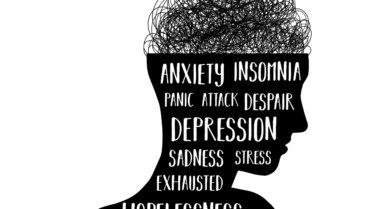Are you someone who constantly sacrifices sleep just to meet deadlines or catch up on your favorite TV show? While this may seem like a normal routine, studies have shown that insufficient sleep can heighten the risk of anxiety, depression and even bipolar disorder.
In today’s fast-paced world, where mental health is often overlooked, it’s important to have a good night’s rest for both physical and emotional well-being. So if you’re ready to prioritize self-care and invest in your mental health, keep reading to find out why lacking adequate Zzzs shouldn’t be ignored!
Introduction to Sleep Deprivation
Many people do not get enough sleep. In fact, according to the National Sleep Foundation, 50-70 million US adults have a sleep disorder. That’s a lot of people who are not getting the recommended 7-9 hours of sleep per night.
Sleep deprivation has been linked to many mental health problems, including depression, anxiety, and bipolar disorder. It can also worsen symptoms of existing mental health conditions. If you’re not getting enough sleep, it’s important to talk to your doctor about it.
There are many factors that can contribute to sleep deprivation. For example, shift work or jet lag can disrupt your body’s natural sleep rhythm. Stress and anxiety can also make it difficult to fall asleep or stay asleep.
If you’re struggling with sleep deprivation, there are some things you can do to help yourself get more restful sleep. Make sure to keep a regular bedtime and wake time. Create a relaxing bedtime routine that includes winding down for 30 minutes before going to bed. And avoid caffeine and alcohol in the evening.
How Sleep Deprivation Affects Your Mental Health
When you don’t get enough sleep, it can take a toll on your mental health.Sleep deprivation can cause irritability, anxiety, and depression. It can also make it difficult to concentrate and remember things. If you’re struggling with mental health issues, getting enough rest is essential for managing your symptoms and improving your mood.
Sleep deprivation can also affect your physical health. It increases your risk of developing conditions like heart disease, diabetes, and stroke. Lack of sleep has also been linked to an increased risk of certain types of cancer. If you’re already dealing with a physical health condition, not getting enough sleep can worsen it.
Finally, sleep deprivation can weaken your immune system and make you more susceptible to infection and illness. It can also lead to fatigue and interfere with your ability to stay productive throughout the day.
Getting enough quality sleep is key for maintaining good mental and physical health. If you’re having trouble sleeping or dealing with symptoms of a mental health disorder, talk to your doctor about possible solutions.
Coping Strategies for Sleep Deprivation
If you’re regularly waking up feeling exhausted and struggling to concentrate during the day, it’s likely that you’re not getting enough sleep. Sleep deprivation can have a significant impact on your mental health, affecting your mood, concentration and ability to cope with stress.
There are a number of things you can do to try and improve your sleep:
• Establish a regular sleep routine and stick to it as much as possible. This means going to bed and getting up at the same time each day, even at weekends.
• Create a calm and relaxing environment in your bedroom, which is free from distractions like technology. Make sure the temperature is comfortable and consider using blackout curtains or an eye mask to block out any light.
• Avoid caffeine and alcohol in the evening as they can interfere with sleep. Instead, relax with a warm bath or herbal tea before bedtime.
• Exercise regularly during the day as this can help promote better sleep at night. However, avoid exercising close to bedtime as this can make it harder to fall asleep.
• Avoid looking at electronic screens before bed, as the light can affect your body’s natural sleep cycle.
• If you can’t fall asleep after 20 minutes of trying, get up and do something relaxing until you are tired again. This will help to break the association between lying in bed and not being able to sleep.
Effects of Disrupted Circadian Rhythms
The National Sleep Foundation report that insufficient sleep can have a profound effect on our mental health. People who don’t get enough sleep are more likely to suffer from anxiety, depression, and other mental health problems.
Sleep deprivation can also impact our ability to think clearly and make sound decisions. When we’re tired, we’re more likely to make mistakes and have trouble concentrating. This can lead to serious consequences in our personal and professional lives.
If you’re struggling to get enough sleep, it’s important to talk to your doctor or a mental health professional. There are many treatments available that can help you get the rest you need. Don’t ignore the problem—insufficient sleep can have a serious impact on your mental health.
Additionally, disrupted circadian rhythms can lead to decreased alertness and productivity. It may also impact our overall health, including raising the risk of obesity, hypertension, diabetes, and even some forms of cancer. As such, it is important to make sure we are getting enough sleep in order to help maintain regular circadian rhythms.
Long-term Effects of Insufficient Sleep
Chronic sleep deprivation can lead to a number of health problems, including an increased risk for mental health issues. While it is not clear exactly how sleep deprivation and mental health are linked, research has shown that there is a strong correlation between the two.
People who suffer from chronic sleep deprivation are more likely to experience anxiety, depression, and other mental health disorders. They may also have difficulty concentration and experiencing feelings of well-being. In addition, chronic sleep deprivation can lead to physical health problems, such as high blood pressure and heart disease.
If you are struggling with sleep deprivation, it is important to talk to your doctor about treatment options. There are a number of ways to improve your sleep habits and get the rest you need. With treatment, you can improve your overall health and well-being.
Bottom line: Sleep deprivation can have long-term effects on mental and physical health. If you are struggling with sleep issues, it is important to talk to your doctor and develop a plan for improving your sleep habits.
Ways to Improve Your Sleep Quality
There are a number of things you can do to improve your sleep quality:
- Make sure your bedroom is dark, quiet, and cool.
- Establish a regular sleep schedule and stick to it as much as possible.
- Avoid caffeine and alcohol before bed.
- Avoid working or using electronic devices in bed.
- Get up and move around every few hours to keep your body active.
- Practice some relaxation techniques before bedtime.
- Make sure you’re getting enough physical activity during the day.
- Pay attention to your diet and make sure you’re eating healthy foods throughout the day.
- Avoid looking at bright screens late in the evening.
- Try to eliminate stress from your life as much as possible.
Conclusion
When it comes to mental health, there is no denying the importance of getting enough sleep. It can be easy to overlook this aspect of one’s wellbeing, but doing so can have serious consequences in terms of both physical and psychological well-being.
This article has looked at why insufficient sleep should not be overlooked when it comes to maintaining good mental health, and hopefully readers now understand the detrimental effects a lack of quality rest can have on their overall wellbeing.
Taking these facts into consideration and prioritizing sufficient restorative rest may just prove invaluable in managing mental health difficulties over time.





Add Comment